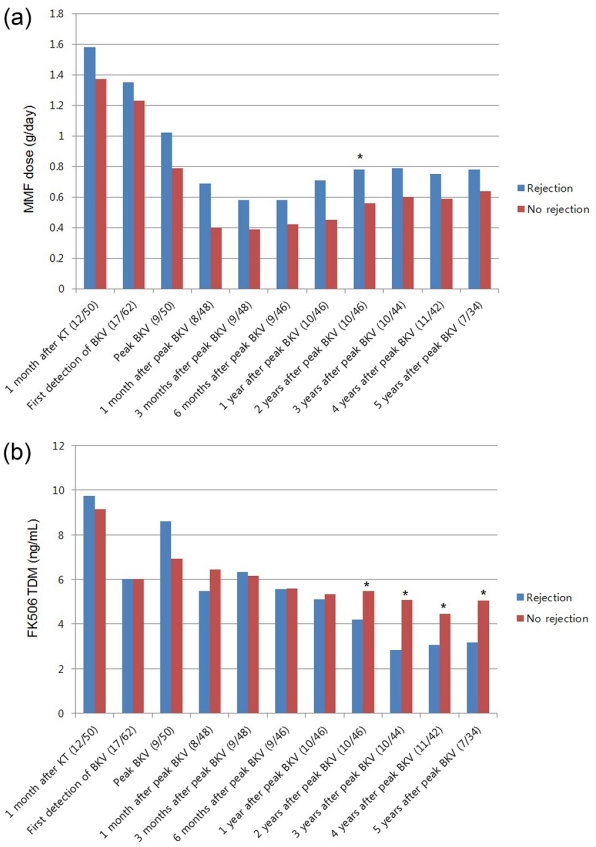The Risk Factors of Acute Rejection in Patients with BK Nephropathy after the Reduction of Immunosuppression
1Department of Internal Medicine, Division of Nephrology, Asan Medical Center, Seoul, Republic of Korea
2Department of Surgery, Asan Medical Center, Seoul, Republic of Korea.
Meeting: 2018 American Transplant Congress
Abstract number: 459
Keywords: Immunosuppression, Kidney transplantation, Polyma virus, Rejection
Session Information
Session Name: Concurrent Session: Kidney: Polyoma
Session Type: Concurrent Session
Date: Tuesday, June 5, 2018
Session Time: 2:30pm-4:00pm
 Presentation Time: 2:30pm-2:42pm
Presentation Time: 2:30pm-2:42pm
Location: Room 2AB
Background: BK nephropathy (BKN) affects graft function and increases the risk of graft failure. The reduction of immunosuppression is the main treatment for BKN. However, acute rejection may develop following immunosuppression reduction, and data regarding the risk factors of acute rejection during the post-reduction period are insufficient.
Methods: Of 758 patients who received a kidney transplantation (KT) between 2008 and 2011, 79 who underwent immunosuppression reduction as BKN treatment were enrolled. The risk factors of acute rejection after immunosuppression reduction were identified using multivariate logistic regression analysis.
Results: During the median follow-up period (75 months), acute rejection developed in 21.5% of study group patients and in 22.5% of KT recipients without BKN. The rejection group showed a trend of higher body mass index (24.13±3.92 vs. 22.40±3.31kg/m2, P=0.070) and lower FK506 levels than the no rejection group, although mycophenolate mofetil (MMF) doses were not lower in the rejection group. A greater number of patients in the rejection group exhibited reduced calcineurin inhibitor (CNI) level by>20% at 1 month after initial BKV detection (34.2% vs. 7.9%, P=0.008). Multivariate analysis indicated that the peak BKV PCR level (odds ratio [OR], 0.136; 95% confidence interval [CI], 0.025–0.732; P=0.020), MMF discontinuation (vs. MMF reduction; OR, 0.112; 95% CI, 0.020-0.618; P=0.012) and CNI level reduction>20% (OR, 33.752; 95% CI, 4.263–267.251; P=0.001) were significantly associated with acute rejection.
Conclusions: Immunosuppression reduction for BKN does not seem to increase the incidence of acute rejection. However, a CNI dose reduction>20% at 1 month after the initial BKV detection can increase the risk of acute rejection.
CITATION INFORMATION: Baek C., Kim H., Yang W., Han D., Park S-.K. The Risk Factors of Acute Rejection in Patients with BK Nephropathy after the Reduction of Immunosuppression Am J Transplant. 2017;17 (suppl 3).
To cite this abstract in AMA style:
Baek C, Kim H, Yang W, Han D, Park S-K. The Risk Factors of Acute Rejection in Patients with BK Nephropathy after the Reduction of Immunosuppression [abstract]. https://atcmeetingabstracts.com/abstract/the-risk-factors-of-acute-rejection-in-patients-with-bk-nephropathy-after-the-reduction-of-immunosuppression/. Accessed January 12, 2026.« Back to 2018 American Transplant Congress
